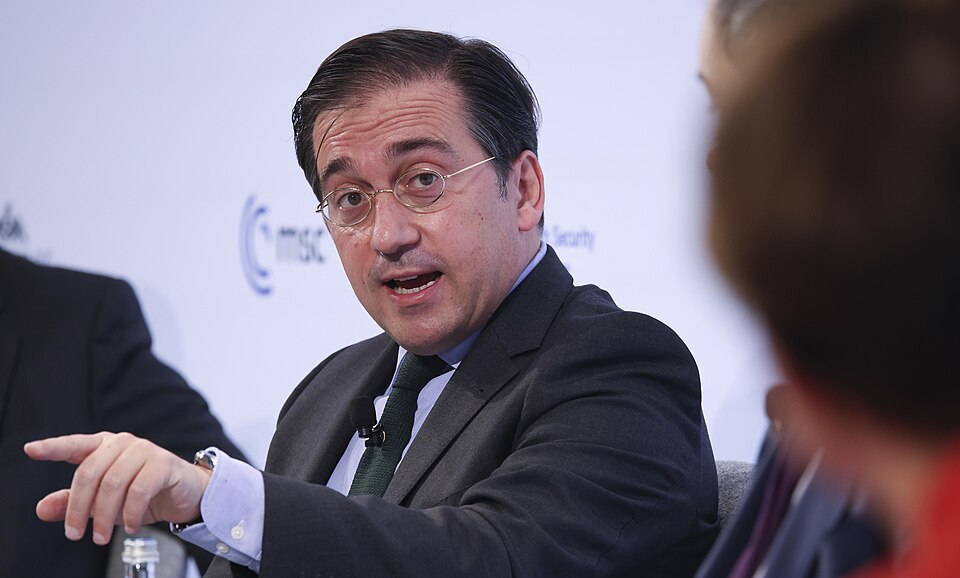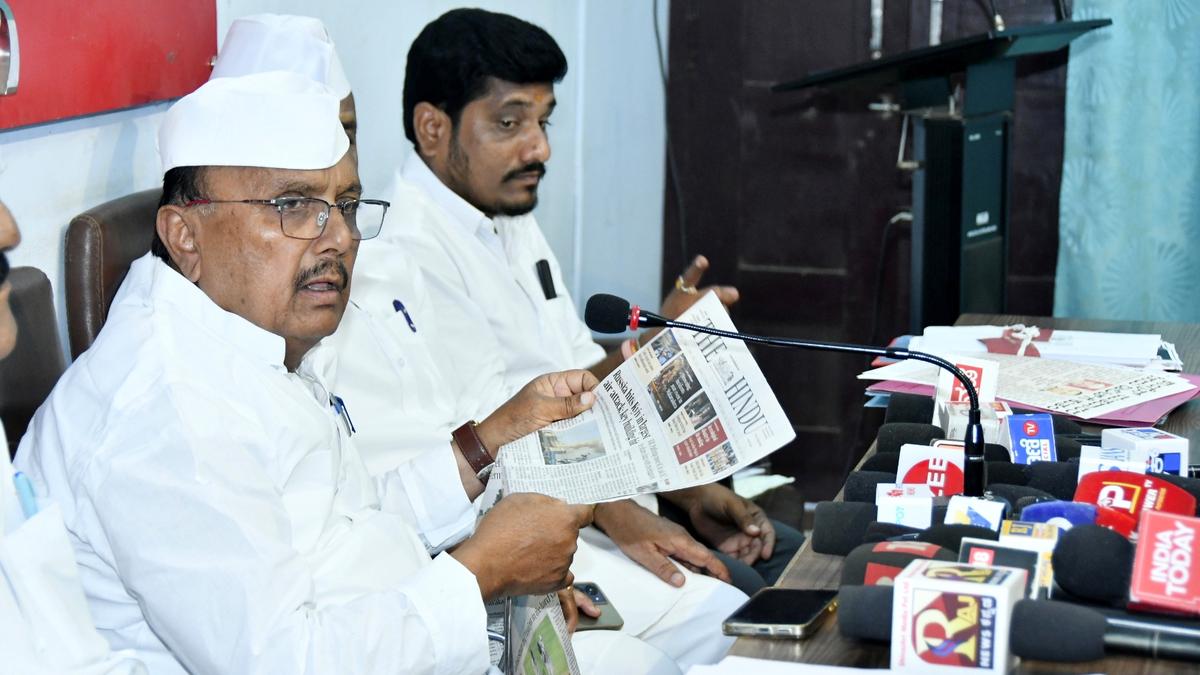Spanish FM says king’s visit to Egypt signals deepening strategic partnership, urges Gaza ceasefire and Palestinian statehood
By MENA
Copyright egyptindependent

Spain’s Foreign Minister José Manuel Albares said on Tuesday that relations between Spain and Egypt are “extremely strong,” underscored by the official visit of King Felipe VI and Queen Letizia to Cairo today at the invitation of President Abdel Fattah El Sisi.
Speaking to Egypt’s state-run Middle East News Agency (MENA), Albares said the royal trip, which comes just six months after both countries elevated ties to a strategic partnership during Sisi’s visit to Madrid in February, reflects the mutual desire to maintain bilateral relations at their highest level, and would help further strengthen momentum across political, economic, and cultural domains.
Albares, who is accompanying the royals on their four-day trip, highlighted recent bilateral agreements signed in Madrid in February on migration, infrastructure and transport, tourism, and economic cooperation, saying they reveal the depth of shared interests and future areas of collaboration.
“Egypt is a priority country for Spanish cooperation,” Albares said, adding that a new development partnership framework will be structured in the coming days, including joint programs for the coming years.
On economic and trade relations, Albares described Egypt as a “key partner,” noting it is Spain’s second-largest market in Africa and sixth-largest supplier on the continent. He said both sides see potential to expand economic ties, with Spanish and Egyptian companies set to meet during an economic forum this week in Cairo.
“Spanish companies are eager to contribute to Egypt’s economy,” he said, pointing to their expertise in sectors such as transport, renewable energy, and water treatment.
On tourism and cultural ties, Albares noted that over 300,000 Spanish tourists visit Egypt annually, a number he hopes will continue to grow. He referenced a tourism cooperation agreement signed during Sisi’s visit to Madrid as a key framework for future collaboration.
He also emphasized cultural ties, calling Egypt’s heritage “immensely rich” and highlighting the work of 14 Spanish archaeological missions currently operating in the country. “We have been cooperating in this field for decades,” he said.
Speaking about Gaza crisis and regional stability, Albares praised Egypt’s role under President Sisi in mediating between Israel and Palestinian factions, facilitating humanitarian aid entry into Gaza, and pushing for a ceasefire and a two-state solution.
“Egypt plays a pivotal role in mediation efforts,” he said, adding that he would reiterate Spain’s appreciation for Cairo’s efforts during upcoming meetings.
Albares stressed that the cycle of violence must not be allowed to destroy Gaza and the West Bank, warning that the prospect of achieving the peace Palestinians and the region deserve is becoming increasingly distant.
He said Spain would continue to do everything in its power to advance the implementation of the two-state solution, which he described as the only viable path to meet the legitimate aspirations of both peoples and to secure a just and lasting peace in the region.
Regarding Egypt’s role in brokering the recent agreement between Iran and the International Atomic Energy Agency, and its broader contributions to international security and non-proliferation efforts, Albares welcomed Cairo’s efforts that led to the 9 September agreement.
He underlined that there is no military alternative to resolving the Iranian nuclear issue and said Spain urges all parties to commit to reaching a political agreement, which he called the only option to ensure the purely peaceful nature of Iran’s nuclear program and to prevent further escalation.
Albares said Spain supports and will continue to support the work of the IAEA, stressing the need to preserve the global non-proliferation regime. He added that Spain welcomes all diplomatic and political efforts aimed at achieving that goal.
Albares underscored that Spain has been among the most vocal countries in advocating for Palestinian rights and upholding international law during the Gaza war. He pointed to a package of nine urgent measures approved last week, including: Strengthening the arms embargo on Israel (in place since October 2023); Banning the transit of fuel-laden vessels bound for the Israeli military through Spanish ports; Denying airspace access to aircraft carrying weapons to Israel; Prohibiting imports from Israeli settlements in the occupied Palestinian territories; and Imposing sanctions on Israeli National Security Minister Itamar Ben-Gvir and Finance Minister Bezalel Smotrich for actions violating international law and human rights.
Albares said Spain has increased its financial support to the Palestinian Authority, launched new cooperation projects, and expanded its humanitarian assistance and development cooperation in Gaza, adding that total aid will reach 150 million euros by 2026, including a larger contribution to UNRWA, the UN agency for Palestinian refugees.
The top Spanish diplomat said Spain has maintained a leading stance on the Middle East conflict since the start and continues to push other European Union (EU) and non-EU countries to adopt a similar approach.
He described the continued Israeli military escalation in the region—including strikes in Lebanon, Syria, Yemen, and most recently Qatar—as “extremely serious” and a clear breach of international law.
He strongly condemned the attack on Qatar, calling it an “unacceptable violation” of the sovereignty of a country that Spain considers a close friend and partner in the Middle East. Albares said he had recently spoken with Qatar’s prime minister and foreign minister to express Spain’s solidarity and support for international law.
The Spanish minister noted that the international community had widely condemned the attack, with the UN Security Council denouncing it during an emergency session held last Friday.
On the issue of Palestinian statehood, Albares said Spain regrets that the Palestinian delegation will not be able to attend the UN General Assembly in New York this year due to what he described as an “unjustified decision” to deny or revoke their visas. He called for the reversal of this decision to ensure that “Palestine’s voice is heard at the United Nations.”
Albares emphasized that since the October 7 attacks in 2023—which Spain unequivocally condemned—Madrid has insisted that the time has come for a final political solution that delivers long-overdue peace to the region.
“We are convinced that a political settlement based on the two-state solution is the only way to achieve lasting peace,” he said. “Recognition [of Palestine] is a necessary step on this path and an essential part of that process.”
Albares stressed that “a Palestinian state is a prerequisite for peace and negotiations—not the result of them.” He added that Spain would continue advocating for full Palestinian membership at the United Nations, which he said had become a pressing necessity.
He pointed to the upcoming high-level peace summit scheduled for September 22 in New York as a key moment to assess the growing number of states committed to recognizing Palestine and implementing irreversible measures toward a two-state solution.
According to Albares, this international momentum includes a shift within the European Union. He cited last week’s proposal by the president of the European Commission to partially suspend the EU-Israel Association Agreement—something Spain has long called for. However, he noted, Madrid continues to push for a complete suspension of the deal.
Marking the 30th anniversary of the 1995 Barcelona Process—which aimed to foster Euro-Mediterranean cooperation based on peace, security, and shared prosperity—Albares said the moment should be seized to revive the only regional organization bringing together 43 countries in a structured political dialogue.
He said Spain would continue to lead discussions about the Mediterranean’s future and pursue initiatives promoting peace, stability, rule of law, and socioeconomic development.
The minister also said that on one hand, Spain hopes the European Union will adopt a new Mediterranean Charter before the end of the year. On the other hand, in a parallel process, a new strategic vision to renew the Union for the Mediterranean will be adopted during its 10th Regional Forum, which will coincide with the 30th anniversary of its founding, he added.
He explained that the 10th Regional Forum will offer an opportunity—just as in past years since 2023—to address the major challenges posed by the war in Gaza and regional instability in cooperation with partners across the Mediterranean. He added that Barcelona will once again serve as the capital of the Mediterranean and a hub for Euro-Mediterranean dialogue, at a time when dialogue and cooperation—the spirit of the Barcelona Process—are more essential than ever.



